- Home
- Gaelen Foley
Lady of Desire
Lady of Desire Read online
CONTENTS
TITLE PAGE
DEDICATION
MAP
ACKNOWLEDGMENTS
CHAPTER ONE
CHAPTER TWO
CHAPTER THREE
CHAPTER FOUR
CHAPTER FIVE
CHAPTER SIX
CHAPTER SEVEN
CHAPTER EIGHT
CHAPTER NINE
CHAPTER TEN
CHAPTER ELEVEN
CHAPTER TWELVE
CHAPTER THIRTEEN
CHAPTER FOURTEEN
CHAPTER FIFTEEN
CHAPTER SIXTEEN
CHAPTER SEVENTEEN
CHAPTER EIGHTEEN
AUTHOR’S NOTE
BY GAELEN FOLEY
ALSO BY GAELEN FOLEY
EXCERPTS FOR GAELEN FOLEY
PILLOW TALK
COPYRIGHT
To Mom and Dad “G”—
Thanks for all of your enthusiasm and
support these many years
and for raising such a wonderful son…
Love also to Grandma and Grandpa,
who know how to smile under any circumstances.
Your lifetime of love together is an inspiration.
Love always,
Gaelen
ACKNOWLEDGMENTS
I wish to thank the much-admired Regency author Emily Hendrickson; trusty on-site correspondent, Sally Roberts; widely regarded Regency scholar, Nancy Mayer; friend of writers and canines, Gail Simmons of Galema Pointers; and new author Mary Blayney, for their generous help on various points of research that came up during the writing of this book. Several heads are definitely better than one! Thank you, ladies, for so graciously sharing your expertise.
CHAPTER ONE
London, 1816
The hackney coach rumbled under the arched stone passage and rolled to a halt in the torchlit innyard, but even before the driver could throw the brake, let alone descend to assist his solitary passenger, the door swung open and she jumped out—a tempestuous, tousle-headed eighteen-year-old with the fire of rebellion in her dark eyes.
Sans maid, sans chaperon, Lady Jacinda Knight thrust the carriage door shut behind her with a satisfying slam. She turned, shrugged her leather satchel higher onto her shoulder, and passed a simmering glance over the galleried coaching inn with its double tier of white-painted balustrades as a pair of postboys dashed out to assist her.
“My luggage, please,” she ordered, heedless of them gawking at her slender figure wrapped in a ruby velvet redingote with rich sable fur at collar and cuffs. She paid the coachman, then marched across the cobbled yard, her guinea-gold corkscrew curls bouncing with her every determined stride.
At the threshold of the busy inn, she paused, warily scanning the motley assortment of bickering, rumpled travelers. A child squalled on his mother’s hip; plain, rustic-looking folk dozed on chairs and benches waiting for their stagecoaches to depart. A drunkard was making a nuisance of himself in one corner, while a beggar boy had crept in to escape the damp chill and huddled near the crackling hearth.
Lifting her chin a trifle self-consciously, she proceeded into the long room among what her countless wellborn beaux would have called “the Great Unwashed.” She felt their stares following her, some rude, some merely curious. She noticed a man squinting at her feet as she passed and realized that beneath the long hem of her coat, her gold satin dancing slippers were visible.
She gave him a scowl that suggested he mind his own business and yanked the fur-trimmed hem over her toes. Doing her best to keep her feet tucked out of sight, she strode to the high wooden counter, where the booking agent sat ignoring the lobby’s chaos, safely hidden behind a crinkled copy of the London Times. Above him hung a chalkboard scrawled with a timetable of arrivals and departures, fares and destinations.
Jacinda tugged briskly at her gloves and hoped she looked like she knew what she was doing. “Yes, excuse me, I require passage to Dover.”
“Stage leaves at two,” he grunted without lowering his paper.
Her eyes widened at such rude, poor service. “You misapprehend me, sir. I wish to hire a post chaise.”
This got his attention, for only the wealthy could afford to hire the yellow-painted private carriages. He peered over his paper, then heaved up out of his chair and slouched over to attend her just as the two postboys came laboring in under her hastily packed traveling trunks. The booking agent plucked his quill pen out of the inkpot and wiped his nose with ink-stained fingers. “Destination?”
“Dover,” she repeated crisply. “How soon can the chaise be made ready?”
He glanced over his shoulder at the dusty wallclock, then shrugged. “Twenty minutes.”
“I shall want four horses and two postilions.”
“It’ll cost ye extra.”
“It does not signify.” Absently pulling her small leather money purse out of her satchel, she hurried to tip the postboys.
The booking agent’s eyes glazed over as he stared at her purse, plump with gold guineas and bright silver crowns and shillings. His quill pen hovered over the blank waybill, his whole demeanor improving at once. “Ahem, my lady’s name?”
“Smith,” she lied evenly. “Miss. Jane. Smith.”
He glanced around for her chaperon, footman, or maid, of which, for once in her life, praise heaven, she had none. He raised his scraggly eyebrows. “Will Miss Smith be traveling alone, then?”
She lifted her chin a notch. “Quite so.”
His dubious look alarmed her. Holding his gaze like a seasoned gamester, Jacinda slid a few coins across his desk. Pursing his mouth, he pocketed them with no further questions, and she breathed a sigh of relief. Then the booking agent entered her alias in his logbook and copied it onto the waybill. This done, he pointed with his quill pen to her two traveling trunks piled behind her. “That all your baggage, Miss, er, Smith?”
She nodded, laying her gloved hand oh-so-casually over the gilt-tooled coat of arms emblazoned near the clasp. Hiding her family crest from his view, she waited until he bent his head again to continue filling out the waybill, for if he saw it, she knew that no bribe would be sufficient to dissuade him from sending back to Almack’s for her tribe of formidable elder brothers, who would come rushing to drag her home in a trice. Aiding and abetting her escape, after all, was akin to crossing all five of the Knight brothers, a blunder no man in the realm dared make; but Jacinda refused to be thwarted. She was going to Dover and thence to Calais, and no one was going to stop her.
Soon the booking agent had collected her payment and had sent the lads out to ready the chaise. While they bore her trunks away to be loaded into the boot, she paced restlessly in the lobby, nearly jumping out of her skin each time the tinny horn blew, announcing another stagecoach’s arrival or departure.
Since she had a bit of a wait, she sat down on the bench by the wall beneath the candle-branch. Loosening the ribbons of her bonnet, she reached into her satchel and pulled out her beloved, well-worn copy of Lord Byron’s The Corsair to read a bit while she waited. She tried to lose herself in the romance of the dashing outlaw, but she could not concentrate with the excitement of her adventure racing through her veins.
Nervously, she checked her travel documents one more time, securely tucked between the pages of the book, while memories of her Continental tour danced through her head. Two years ago, her straitlaced eldest brother and main guardian, Robert, the duke of Hawkscliffe, had been assigned to the British delegation at the Congress of Vienna. He had taken his wife, Bel; Jacinda; and her companion, Lizzie, with him on the trip to enjoy the lavish festivities celebrating the end of the war. With Napoleon locked away at last, it had been safe again to tour the Continent. Robert had led them on a roundabout course to the Austr
ian capital, visiting some of the most important and beautiful cities of Europe along the way—and at each one, a whole new crop of charming young gentlemen to flirt with, she thought in wicked pleasure. What fun it had been—though blind Cupid, devil take him, had continually missed her heart with his golden arrows. Of all the places she had seen, Paris, the city her mother had loved, had been holy ground to Jacinda.
Soon, she thought dreamily, she would be in Paris again, among her mother’s glamorous friends of the decimated French aristocracy. At last, she would be free. By heaven, she would not stay here and be forced to marry Lord Griffith, no matter how perfect he was or how advantageous the match, for their families’ lands adjoined each other in the northern wilds of Cumberland; no matter, even, that he was the only man her brothers unanimously trusted to become her husband, their friend from boyhood days and on through Eton and Oxford.
A handsome, sophisticated man of nearly forty, Ian Prescott, the marquess of Griffith, was possessed of a cool, steady temperament that was just the thing, her brothers had decided, to balance her “youthful passions” and “headstrong ways.” For his part, Ian was tranquilly prepared to marry her whenever she was deemed ready and willing, but Jacinda refused to be given in holy matrimony to one who was not her love, not her soul mate, but a man she thought of as an extra brother—yet another skilled, patient guardian who would gently tell her what to do, make all her decisions for her, try to buy her obedience with expensive baubles, and treat her like a pretty little fool.
Tonight at Almack’s, in the hopes that it was the one place she would not dare make a scene, Robert had told her that after her recent bit of mischief at Ascot, the much-anticipated match between their two powerful families must no longer be delayed. The negotiations for her marriage settlement were almost finished, he had said, and tomorrow they would set the wedding date. She had been nothing less than shocked.
The problem with her brothers was that they were a hundred times too protective and could not take a joke where she was concerned. It had been nothing but harmless fun, that day at the horse races, she thought innocently.
Informed of her fate, however, she had instantly realized drastic action was in order. There was no reasoning with Robert when he got that holier-than-thou look in his eyes. His wrathful gaze and rumbling tone had reminded her afresh that he was not merely the starchy, lovable eldest brother whom she had cheerfully tormented throughout her childhood; he was also one of the most powerful men in England, an imperious, august personage whom even the prince regent found intimidating. So, she had slipped out of Almack’s; run all the way home; hastily packed her things; and whistled for the first hackney that came rolling down St. James’s Street around the corner from her home, the imposing Knight House on Green Park.
“Spare a penny, m’um?”
Startled out of her thoughts by a small, timid voice, she looked up from her traveling documents and instantly suffered a pang of compassion.
Before her stood the bedraggled street urchin who, earlier, had been crouching by the hearth fire. The child stared at her imploringly, his small, grimy hand held out in hopeful expectation. He looked about nine years old. His puppy-dog eyes were huge and brown, his little face smudged with dirt. His filthy clothes, little more than rags, hung off of his bony frame like a scarecrow’s. His grimy feet were bare. Her heart clenched.
Poor, miserable pup.
“Please, m’um?” The pitiful thing shivered and sent a furtive glance over his shoulder at the booking agent, as though afraid of being noticed and thrown off the premises.
“Of course, my dear,” she murmured tenderly, opening her satchel at once. She pulled out her embarrassingly fat change purse and picked out three shiny gold guineas—then a fourth. It was as much as she could spare with the long and costly journey to France ahead of her.
The boy stared, wide-eyed, at the small fortune of gleaming coins, but made no move to take it, as though he didn’t dare.
Her gaze softened at his mistrust. Clearly, the child had known little of kindness. Loosely holding her money purse in her left hand, she held out her right, offering him the coins. “Go on, take it,” she coaxed gently, “it’s all right—”
Suddenly his grubby hand shot out and snatched her money purse. He bolted off across the lobby in an instant, her coin purse clutched tightly to his chest. Her jaw dropped. For a second, she could only stand there in shock, left holding nothing but the four gold coins she had meant to give to him. Sheer outrage exploded through her veins.
“Stop, thief!”
Nobody paid her the slightest attention, and it was altogether possible that this shocked her even more than the theft.
Her eyes narrowed to blazing slashes. “Right!” she muttered under her breath. Slinging her satchel over her shoulder lest it be stolen, too, she dashed out after the little pilferer herself. A moment later, she burst out into the clammy April night and saw the boy pounding across the sprawling innyard.
“You, sirrah! Stop this instant!”
She heard a trail of triumphant laughter as the scamp flashed out of sight around the corner of the innyard’s enclosing wall. He was as quick as a cat, apparently accustomed to fleeing for his life. She picked up her skirts and raced after him over the dewy cobbles, but she might as well have been barefoot, for her dancing slippers were instantly soaked and torn.
Her untied bonnet fell off and went tumbling down her back. She left it where it lay and flung around the high brick wall. There was a fortune in that purse. Without it, her plans were a shambles.
She saw him racing up Drury Lane. “Come back here, you little savage!” Dodging an arriving stagecoach, she kept her gaze fixed on the child, pouring on all the speed she could rally, her satchel bumping against her side.
Insolent as brass, the pickpocket glanced over his shoulder and saw her gaining on him. Taking evasive action, he ducked into a dingy side street, but Jacinda would not be shaken, heedlessly following him deeper and deeper into a maze of dark lanes and cramped, twisting alleyways, for it was a matter of pride now. She would not be gulled and robbed blind by a mere street arab. Not after the night she was having.
Giving chase with the same stubborn determination that had earned her a reputation as a sportswoman of superior skill at riding to the hounds, she ignored each pounding jolt to her knees and hollered after him again like a fishmonger’s wife, her breath beginning to strain against her light stays. “Don’t you know you could be hanged for this, you little heathen?”
He ignored her, weaving nimbly through a series of narrow, twisting passageways into the seedy back alleys toward Covent Garden Market. Here piles of litter crawling with rats lined the cramped brick walls, but Jacinda barely noticed them, all her focus trained on her wily quarry.
Malnourished as he was, the boy soon began to tire. Urged on by imminent victory, Jacinda poured on a fresh burst of speed, her fingertips grazing him. He glanced wildly over his shoulder. Surging forward, she caught him suddenly, seizing the back of his filthy coat collar.
He let out a cry of protest as she flung him around to face her. He fought like a fish on a line, but she held his coat tightly in her grasp.
“Hand it over!” she ordered, panting heavily. Dangling from his coat collar, the little boy spun around and kicked her in the shin.
She seized his ear, her brow knitted in fury.
“Ow!”
“You are a very bad little boy. Didn’t I already give you more money than you could earn in months?”
“I don’t care! Let go!” He held onto the purse with both grubby hands while she tried with her free hand to pry it loose.
As they struggled, more of her hair worked free of the artful arrangement her maid had taken such pains to create before the ball. “Give it back, you little savage! I am going to France, and I need my blunt—”
“Aargh!” He let out a cry of kittenish fury as the change purse tore open, exploding in a rain of bright coins.
They flew up int
o the air like gold and silver fireworks by the glint of the full moon, then clattered down in a hail around them, plunking unceremoniously into the thin, greasy layer of grime that coated the brick-laid alley. The child threw himself to the ground and began hastily collecting what he could.
“Leave it alone! That is my property!”
“Finders keep—” the boy started, but abruptly froze and looked up.
Jacinda stopped, too, puzzled by his sudden stillness. “What is it?”
“Shh!” He cocked his head, as though listening for some far-off noise. She could see the whites of his eyes, wide and staring in the darkness. His gaze scanned the impenetrable blackness behind her, his fist clutching the coins he had managed to collect. He reminded her for all the world of some little prey animal, his preter-natural senses alerted to the imperceptible sound of some fierce predator’s approach.
Though the full moon still gleamed brightly overhead and cast a strip of moonlight down the alley’s middle, deep in the shadows along the walls, the blackness was almost palpable.
“I say—”
“Someone’s coming!”
Suspecting another trick, she listened a second longer, then lost patience. “I don’t hear anything—” But even as the words left her lips, a wild, barbaric howl like a war cry floated to them from over the maze of dark alleys. She drew in her breath. “Good God! What was that?”
“Jackals,” he breathed, then leaped to his feet and fled into the night.
She stared after him in astonishment. “Sirrah! Come back here this instant!”
He did not, of course. As silent as an alley cat, the boy had disappeared.
“Well!” Indignantly resting her hands on her waist, Jacinda glared for a second in the direction he had gone, then quickly set to work, eager to escape the lightless passage. She crouched down and began gathering up her scattered funds. Passing an uneasy glance over her surroundings, she plucked gold and silver pieces from the sooty slime, tossing both into her leather satchel. She grimaced at the repugnant job and was cursing herself for naively letting all those people in the lobby see her money, when suddenly, she heard swift, heavy footfalls pounding down the alley toward her.

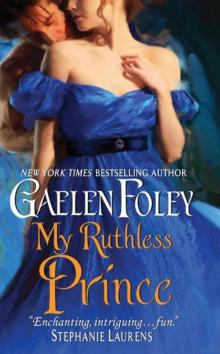 My Ruthless Prince
My Ruthless Prince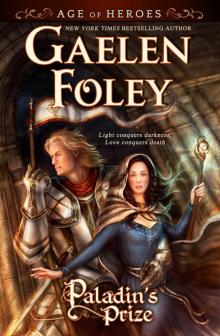 Paladin's Prize
Paladin's Prize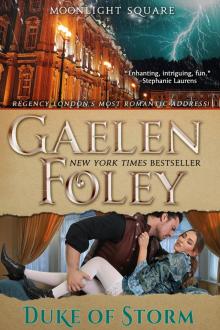 Duke of Storm
Duke of Storm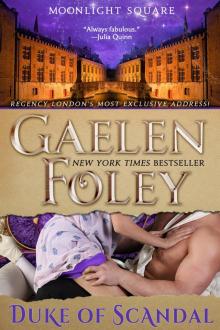 Duke of Scandal (Moonlight Square, Book 1)
Duke of Scandal (Moonlight Square, Book 1)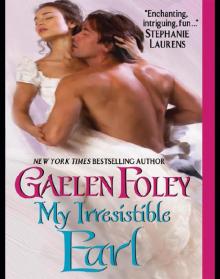 My Irresistible Earl
My Irresistible Earl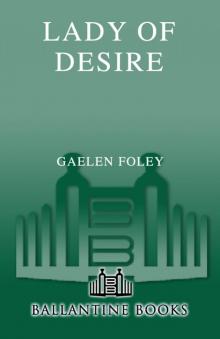 Lady of Desire
Lady of Desire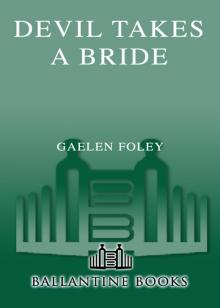 Devil Takes A Bride
Devil Takes A Bride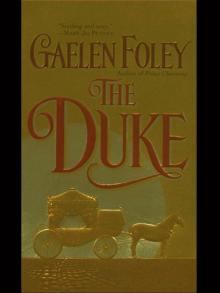 The Duke
The Duke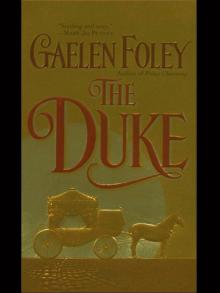 The Duke: The Knight Miscellany Series: Book 1
The Duke: The Knight Miscellany Series: Book 1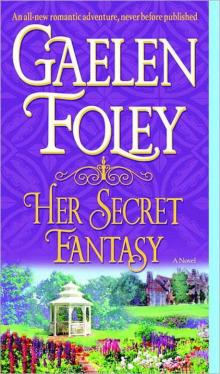 Her Secret Fantasy
Her Secret Fantasy Her Only Desire
Her Only Desire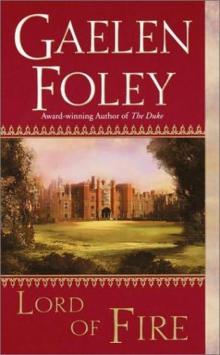 Lord of Fire
Lord of Fire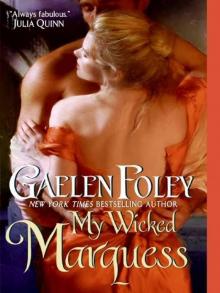 My Wicked Marquess
My Wicked Marquess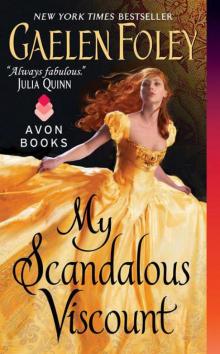 My Scandalous Viscount
My Scandalous Viscount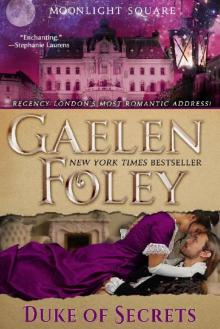 Duke of Secrets (Moonlight Square, Book 2)
Duke of Secrets (Moonlight Square, Book 2)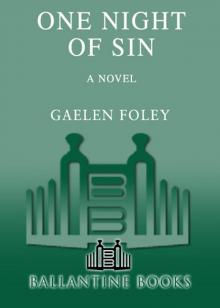 One Night of Sin
One Night of Sin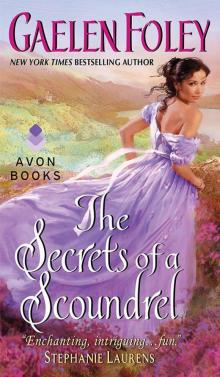 The Secrets of a Scoundrel
The Secrets of a Scoundrel Dream of Me (Harmony Falls, Book 1)
Dream of Me (Harmony Falls, Book 1) His Wicked Kiss
His Wicked Kiss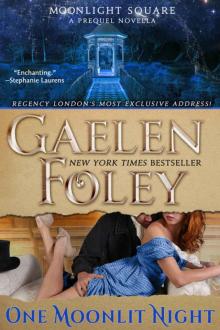 One Moonlit Night (Moonlight Square: A Prequel Novella)
One Moonlit Night (Moonlight Square: A Prequel Novella)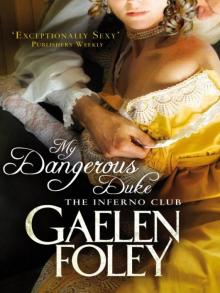 My Dangerous Duke
My Dangerous Duke